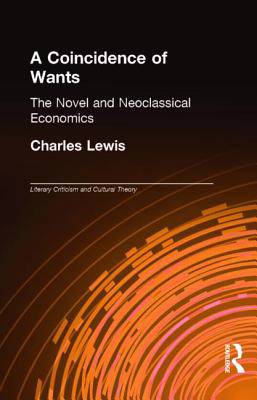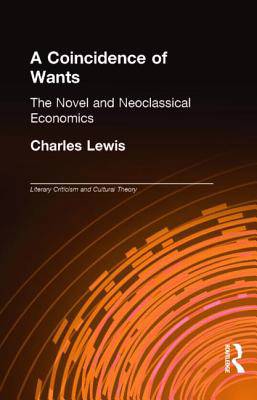
- Retrait gratuit dans votre magasin Club
- 7.000.000 titres dans notre catalogue
- Payer en toute sécurité
- Toujours un magasin près de chez vous
- Retrait gratuit dans votre magasin Club
- 7.000.0000 titres dans notre catalogue
- Payer en toute sécurité
- Toujours un magasin près de chez vous
305,45 €
+ 610 points
Format
Description
This interdisciplinary study examines four major British and American novels in view of key concepts from the mainstream tradition of neoclassical economics. Studies of the novel widely address its connections to capitalism, yet literary critics and theorists rarely make reference to neoclassical perspectives, which have held a key position in the formal analysis of the marketplace for over a century.
Lewis argues that this overlooked area of economic thought, with its emphasis on subjective value, individual agency, and utility maximization, points to a previously unrecognized and important coincidence of wants between economic and novelistic discourse. In each of the four readings, Lewis uses a single economic problem from neoclassical theory as a model for interpreting novelistic form and content as economic configurations. Topics include narrative deferral, detour, and return as a performance of capital formation and economic development in Daniel Defoe's Robinson Crusoe; the emergence of the creative, risk-taking entrepreneur in Mary Shelley's Frankenstein; the representation of money in the romantic realization of trade in Herman Melville's Moby Dick; and a consumer utility theory of naturalist desire and indifference in Theodore Dreiser's Sister Carrie. Underscoring how neoclassical theory variously elaborates on and departs from other economic approaches and periods, the author also addresses the limitations of, and the possibilities of profitable exchange with, other critical frameworks for understanding literal and symbolic economies in narrative fiction more broadly.Spécifications
Parties prenantes
- Auteur(s) :
- Editeur:
Contenu
- Nombre de pages :
- 166
- Langue:
- Anglais
- Collection :
Caractéristiques
- EAN:
- 9780815336488
- Date de parution :
- 10-11-99
- Format:
- Livre relié
- Format numérique:
- Genaaid
- Dimensions :
- 164 mm x 223 mm
- Poids :
- 349 g

Les avis
Nous publions uniquement les avis qui respectent les conditions requises. Consultez nos conditions pour les avis.






